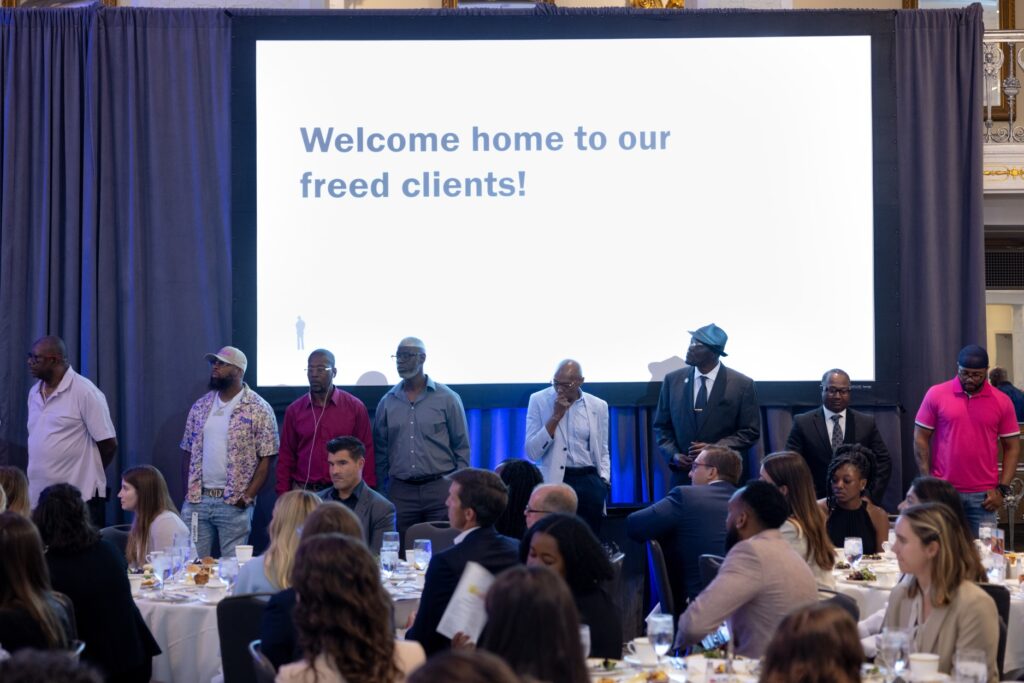A Year On: Moving Our Exoneree Support Program Forward
March is National Social Work Month. For wrongfully convicted people, social work services can help ease the transition from prison to freedom. MAIP’s Exoneree Support Program, which we launched last April, helps our clients find housing, employment, healthcare, and other resources they need as they adjust to life after prison. Our Client Services Specialist, Claudia Baker, who is also a Licensed Clinical Social Worker, has spearheaded the program since its launch.

“I’ve really worked on setting up the nuts and bolts of our program,” said Claudia, who most recently was a Hostage Affairs Officer at the State Department, setting up the office that supports hostage victims and their families. Her first priority was finding an online management system where she could store her clinical notes. “The system we have now allows me to keep and organize our clients’ information in adherence with patient confidentiality laws,” she explained. “If one of our staff attorneys would like to understand what happened in a meeting, they can view a general description of the session focus and services provided.”
Next, she standardized our in-house referral system. “I created a referral form that our staff attorneys can complete if they believe a client should meet with me,” Claudia said. She also developed assessment templates that she uses to determine what clients need.
Claudia has met with nine clients so far. She meets with MAIP clients who are freed or exonerated, no matter how long it has been since their release from prison, as well as clients whose cases we are actively litigating. When she meets with incarcerated clients, she works with them to develop a reentry plan.
Every client’s needs are different. “I’ve gone house-hunting with some of our clients; others just ask me for the application forms to housing programs,” Claudia said. “But above all, they just need someone to be there for them and help them through the rebuilding process.”
The traumas of wrongful conviction and incarceration linger long after freedom. Approximately 70 to 80% of exonerees are diagnosed with post-traumatic stress disorder (PTSD), and they may also struggle with depression, anxiety, grief, and substance abuse disorders. “Our clients have to grapple with an entirely different world when they walk out of prison,” said Claudia, who also has experience working with the National Center for Post-Traumatic Stress at the Department of Veterans Affairs. “In some ways, it’s like coming back from war.”
Wrongful convictions are traumatic ordeals for the families of wrongfully convicted and exonerated people as well. As part of our program, Claudia also works with clients’ families. “Most of our clients have supportive families,” she said. “But some resentment can still exist, especially among the kids. Even if the kids believe in their parent’s innocence, they might resent their parent for missing their childhoods.” Some family members may also expect their loved one to be the same person they were before prison. “My role is to help families understand how wrongful conviction and incarceration can affect a person, so they are aware of what to expect when their loved ones come home,” said Claudia.
Thanks to the Venable-Burner Exoneree Support Fund and a generous gift from the trust of Hubert James Williams, we’re hopeful that we will be able to expand in-house services and resources for our clients. Claudia hopes that we can give our clients more “step-down time” in the future: “If a client needs temporary housing before they find a permanent place or before their family is ready for them to move in, our goal is to be able to fund that.” She also wants to organize more events for our clients, such as group dinners or outings to Ravens games. “I want our clients to have opportunities to bond and support each other,” Claudia said.
Coming home from prison can be both exhilarating and overwhelming. As our clients navigate the challenges of reentry, their resilience shines through. “They all have a strong desire to start fresh and leave the past behind,” Claudia said. “It’s not an easy process, but their determination keeps them going.”
On April 4, 2024, Claudia and MAIP Executive Director Shawn Armbrust will be speaking on a panel about exoneree support at the Quattrone Center’s 2024 Spring Symposium. They will discuss MAIP’s Exoneree Support Program and best practices in exoneree support. Their panel will begin at 1:30 PM EST. The event is free and open to the public. Register here.